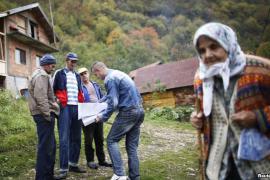Today October 15th, it was completed, the first census of Bosnia-Herzegovina since 1991. The survey was requested by the European Community, with aspirations of enlarging the Union- of which Bosnia aims to join.
The census is a very important event for the country, the last time that a report of this type was done was before the genocide. The risk, above all, is that it will exacerbate ethnic tensions that are not yet healed from 20 years ago.
At the center of the questionnaire are three questions-number 24, 25, and 26- that refer to nationality, ethnic group, and religious affiliation. Since the end of the genocide, Bosnia-Herzegovina has been divided, constitutionally and administratively, in three large groups: Serbs, Croats, and Bosniaks. The structure of the country- based on the stability of the Dayton Agreement-was overall ruled discriminatory by the European Court of Human Rights in 2009. The court ruled that the system of separation was unjust according to the criteria about the shares allocated to the three groups- calculated on the basis of the census of 1991-that did not take into account the presence of minorities in the territory, like Jews, and the children of mixed marriages that refused to choose membership of one specific group.
Now, the question goes beyond a mere mathematic calculation. In the census questions ask citizens to specify their exact ethnicity, to check one of the three boxes at their disposition, or in order elaborate on their true ethnicities, to write in the appropriate space. The difficulty is that a simple citizenship of “Bosnian-Herzegovina” does not exist, which demonstrates the fact that, again today, the forms of identification prevalent in the country are essentially ethnic and religious.
Some have seen the census as a possibility to overcome the divisions and to start a process of unity and reconciliation. Activists for human rights have launched a campaign called A Citizen Above All, in order to spread the theme of becoming a part of a nation first and an ethnic group second. From the opposite side, instead, many political and religious leaders have defended the ethnic classification of citizens, concentrating their arguments on “a nation has to declare an exact ethnic group”. In reality, the fear of these groups is that the new photo of the country will cause them to loose their positions, in the light that there is a redistribution of shares based on new data from the census.
“With everything that has happened in the last 10 years, it is no longer possible to imagine a country only of its citizens, it is extremely late-explained Zlatko Dizdarevic, director of Oslobodenje-For this project we will need the next 20 years, but they will need an educative political system, and a system of completely different information than what is present”.
Polls show that only 20% of the population is defined as “Bosnian citizens,” while the rest continue to feel tied to other ethnic groups. A cause of this division is that they have diverse perspectives, but above all different elements of political beliefs. The Bosnian society is in fact fragmented in every sector of daily life: there are different school for children of various ethnicities, separate hospitals, separate telephone companies, even separate companies. This fragmentation is then aggravated by the injury of the conflict, which again opens between the population so that every decision is compared to the results of the war. “With the census-says a Sarajevo-many are afraid to discover how Bosniaks will see that which the Serbs have done to the Bosniaks during the war, and how the Serbs will see that which the Bosniaks and Croats have done to the Serbs.”
The results of the census will return in January, they will show the face of a new Bosnia, still entrapped between a bloody past and an uncertain future.


